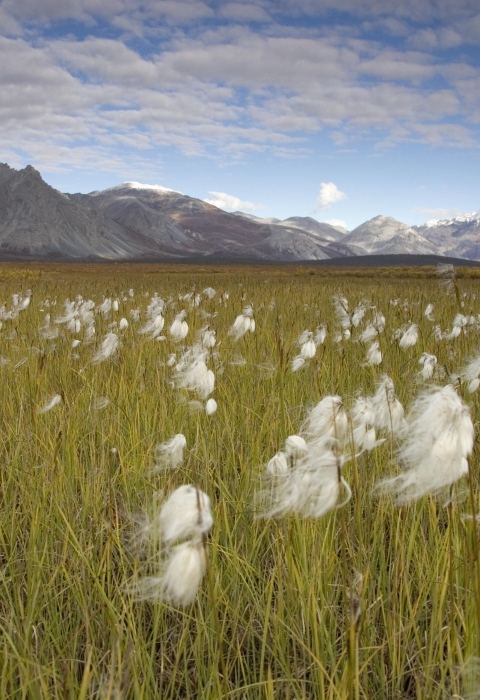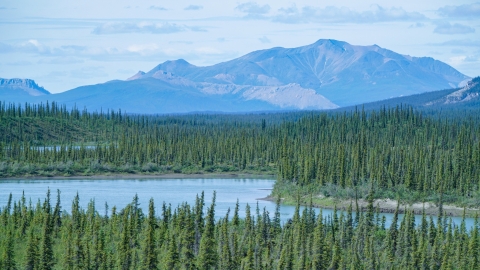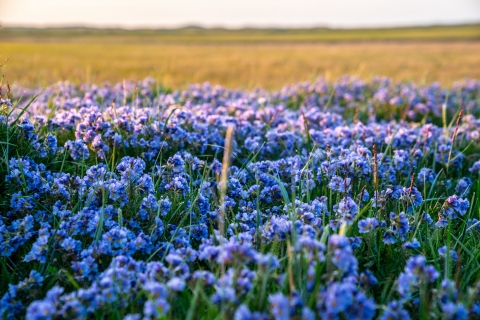The summer in Arctic Village is beautiful and sometimes gets above 100 degrees. During one of those hot summers, my family decided to go on a camping trip for our vacation. As we prepared to leave, we locked down the house and packed our camping gear for a welcoming journey into the mountainous terrain that awaited us, the great Arctic Refuge.
My parents took me and my five siblings for the boat to Red Sheep Creek and the Junjik River in the refuge area for two weeks. The boat ride was amazing, with fresh air and wind blowing in our face as we’re gliding on the river like a bird.
We watched the trees, animals and birds flying by. Once we got to the Red Sheep Creek, we were met with majestic mountains, hills, rivers, lakes and streams. There were many different wildflowers growing everywhere, giving off strong fragrance and it was intoxicating.
We found our campsite and helped set up our tent and start the campfire. We rested and played quietly while we observed the majestic view.
My parents were sharing stories of how our ancestors have walked along these lines many times, migrating after food and shelter to survive.
I couldn’t even imagine the harshest of weather in migrating many miles to seek food and shelter. There were signs of habitation of where they used to camp, is where we were camping now.”
The weather was warm and we wanted to go swimming, so we went looking for a safe spot to swim. We found a shallow beach-like sandy shore and we jumped into the freshest, cleanest glacial river water ever. The sun was shining through the tall spruce tree, reflecting on the sparkling water, as we were splashing water and learning small dives.
As I was swimming, I turned and I saw mom nearby collecting tree gum from a spruce tree. Tree gum is a traditional remedy for healing of cuts and can be used to make tree gum juice for stomach ache. These medicinal plants are still being used today.
During our journey, we carried a limited supply in our boat because of the weight, so we packed very little food, like sugar, coffee, flour, crackers, homemade bread and biscuits. And most of our food was wild.
We went to a nearby lake and dad shot about 20 muskrats, and mom skinned two muskrats, cooked it, and we ate the tail. It was the best part. Later, the muskrat was skinned and we used small nails to nail the skin to a board to dry. I skinned about ten and made muskrat gloves out of it.
So dad hiked to a nearby lake and shot 2 black ducks, and we ran the ducks to mom. She plucked the feathers off, sent it to the fire, then cut up the legs and the wings and put it in the soup pot with rice. Dad put the duck meat on the stick and fanned it out to cook to the fire.
It was slowly dripping duck grease. The duck grease is collected and used for dipping. Meanwhile, mom’s cooking fried bread on a hot grill.
Once that duck soup, meat and fried bread is done, we gather around, give thanks for the food and realize how blessed we were to eat from the land.
The natural food is healthy and delicious. After dinner, we continued to run and play. Then it is starting to get dark, so we all get in the tent, making sure our bed is comfortable, with using spruce tree branch for cushion. In listening to the migratory birds, making beautiful music as they’re flying by, and in with the loon, making lonely tunes.
With all the excitement and fresh air, we went to a deep sleep. We slept soundly until we woke up to the sun, beaming through the tent. Hearing songbirds chirping away and my parents silently drinking coffee and talking.
It was one of my beautiful moments because it was the most perfect morning.
Then we run out of the tent ready for the day. We run to the river and wash our faces with cold water and run to the campfire. And mom had leftover duck and toast ready for us. We couldn’t wait to explore and pick berries and hike around.
Mom was busy sewing beads and we were helping dad build the fish trap. There were teardrops, patches of woodland with flocks of ducks and geese middling around eating. And it was a really noisy.
There was a stream nearby — dad put the constructed fish trap made out of willow and babish in the borough of the stream. We waited until it captured fish. We caught whitefish and grayling. As it was being caught, we put them on the side while dad was cleaning the fish. He took out the trap, so it doesn’t capture more fish because we had enough for now. Then we ran it to the camp and mom started cooking fish with berries in it.
Every day, we explore further from the camp. One day we hike close to the mountain and one of my siblings was picking flowers and wandered off too far and got lost. We called for her, but she was too far. So dad burned one of the spruce trees, and a nearby camper showed up and came to help look for her. We later found her. She had blueberries all over her face and the handful of flowers, but she was OK. She heard her name and climbed to the nearest hill, and my dad spotted her and was rescued. (They burned spruce trees to signal where there’s danger or help is needed.)
Another day mom wanted to pick berries and Labrador tea. Labrador tea are marsh dried herbal tea that grows on the tundra floor, which is good for cold and flu. So we all started toward the hilly site and came across a mountain full of blueberries and Labrador tea. We pick until the sun was almost disappearing behind the mountain and started back toward the camp. We preserve the berries and store in jars.
The next morning, mom made blueberry pancakes and Labrador tea. It was so delicious. A few days later, we continue to Junjik River and set up camp, and it was a same process. The important lesson is that we left no trace and it was like we were not even there.
Indian summer was upon us and it is time to go home. The summer spent at Red Sheep Creek and Junjik River was a memorable one because it was home away from home.
“We walked in the same path as my ancestors, and so many signs that they were once there, and I was happy because the land they ate from was what fed us during our journey to the great Arctic Refuge.”
In Alaska we are shared stewards of world renowned natural resources and our nation’s last true wild places. Our hope is that each generation has the opportunity to live with, live from, discover and enjoy the wildness of this awe-inspiring land and the people who love and depend on it.






